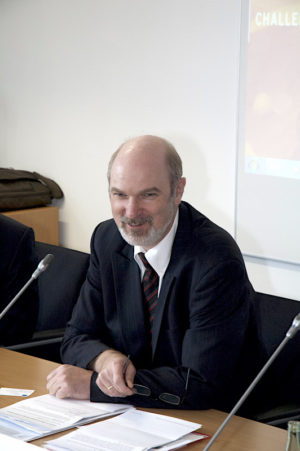An interview with Thomas Schirrmacher by Sergej Pauli
We are grateful to Prof. Dr. Schirrmacher for answering our questions. He is known as somebody who is prepared to give offense, if appropriate. He is known to me primarely for his struggle for persecuted Christians in all the world. His open-minded attitude towards ecumenism, however, has also brought much criticism upon him. He is furthermore known as an author of numerous publications, among them his famous standard work: “Ethics”.
1. How did you come to write books?
I am really an oral-presentation- and lecturing-type person. But in that way I could always present only small extracts to the students, when travekling internationally, and I wanted to leave them with more material for further study. Therefore I began to fix lectures in writing, and I discovered that a thorough book can change lives and even stimulate global discussions.
2. Is there any current book project scheduled?
 Yes, there always is. Besides a complete revision of my book “Human Trafficking” and the English edition of “Coffee Brakes with the Pope”, there is a history of the document “Christian Witness in a Multireligious World” pending.
Yes, there always is. Besides a complete revision of my book “Human Trafficking” and the English edition of “Coffee Brakes with the Pope”, there is a history of the document “Christian Witness in a Multireligious World” pending.
3. Please state your three favourite books (beside the Bible)
John Calvin’s Institution in all stages of revision. The six volums of the Orient series by Karl May. John Grishams The Peican Brief.
4. Which books would you not read again?
Miroslav Wolf’s book about Islam, Rob Bell’s book about hell and three novels by Johannes Mario Simmel, which were required reading in school.
5. In which area do you see the greatest need in today’s Christianity, and where (and/or) how could one most effectively intervene/help?
a) In the illiteracy towards the Bible. We have to become once more a bottom-up Bible-reading movement. De facto, however, with millions of conversions each year, we can’t keep up with the training any more.
b) While I see a worldwide moving towards each other in dogmatic issues in large segments of Christianity today, there are at the same time ethical questions driving the churches further apart, frequently not only deviding one church from another, but also wings within the churches. Without sanctification, however, no Christian and no church will see the glory of God.
6. How do you assess the current reformed awakening among many Christians?
The evangelical movement has in its history witnessed all kinds of more or less good revival movements, which were, as to dogmatic questions, often quite slimly positioned, but which, by way of the commonality with other Christians, adopted the basic stock of Christian, biblical doctrine. Presently we witness worldwide, that thorough reformation doctrine is once more in demand in the evangelical movement. During the 1980s and 1990s I was pretty much a maverick with my views.
7. How did you become a Christian?
Firstly two deaconess sisters explained to me at the age of six, what sin is and why people can’t compensate for them. Thereupon I wanted Jesus not to be just “a” lord, but “my” Lord. At the age of twenty I once again had to take a watershed decision, whether my childlike faith could hold true when faced with „higher criticism“ of the Bible. It could!
8. What does being a Christian mean to you?
Well, primarely, that I can self-critically acknowledge that I sin and make mistakes, that I don’t constantly have to fool others, but that this, on the other hand, is no excuse, but something, which, by way of God’s reconciliation and forgiveness, creates change.
9. What do you see as the foundations of spiritual growth?
The ceaseless prayer that the Spirit of God may reveal to us, where we are wrong and deceive ourselves, so that our biased thinking can be replaced by God’s thinking (Romans 12,1–3).
10. Which historical persons would you like to meet, and what questions would want to discuss with them?
Emperor Constantine, in order to ask him, how much of a real Christian he personally was and to what extend he merely used the church for his politics.
Martin Bucer, in order to ask him, how he dealt with all the attacks and abuses by other Protestants and by Catholics.
The disciple Thomas, in order to ask him where he evangelized and whether he really came as far as India.
11. Is not the Roman-Catholic Church further away from orthodoxy today than at the time of the reformation?
The Catholic Church in the course of history is not static, but subject to strong trends. In some questions she has moved much further away from biblical positions that even at the time of the reformation. That counts for the superelevation of the papal office or the extension of the Marian dogmas. On other issues wrong position of the reformation times have been abandoned, for instance with the permission for the laity to read the Bible and with the mass distribution of the Bible, or with freedom of religion, which renders the religious wars of past times impossible.
Leave a Reply